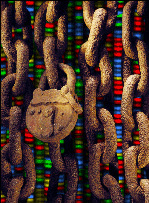The Ethical, Legal and Social Implications Research Program
Congressional Hearings and Testimony on Genetic Privacy and Discrimination
Online Bioethics Resources On Other Sites: DNA Forensics: Frequently asked questions from the Department of Energy
Genetic Discrimination

- Overview of Genetic Discrimination
- Legislation on Genetic Discrimination
- NHGRI's Interest in Genetic Nondiscrimination Legislation
- NHGRI's Policy Recommendations for Genetic Nondiscrimination in Insurance or Employment
- Reports on Genetic Discrimination
Overview of Genetic Discrimination
While most Americans are optimistic about the use of genetic information to improve health, many are concerned that genetic information may be used by insurers to deny, limit or cancel health insurance, and by employers to discriminate in the workplace. They are worried that some insurers may choose not to insure people who are healthy but genetically pre-disposed to future disease onset: such people incur more health-related costs for the insurance company than individuals who are not predisposed. Similarly, they fear that some employers might only employ or retain individuals who are not pre-disposed to future disease onset, since healthy individuals are more productive. Therefore, many lawmakers, scientists and health advocacy groups believe that there is a need for federal legislation to prevent genetic discrimination.
We now have that legislation:
Legislation on Genetic Discrimination
- Genetic Information Nondiscrimination Act of 2008
Complete information about legislation from the 110th Congress on Genetic Nondiscrimination and NHGRI's legislative interest and involvement. - Existing Federal Anti-Discrimination Laws and How They Apply to Genetics
A summary of how the Americans with Disabilities Act, the Health Insurance Portability and Accountability Act of 1996 and the Civil Rights Act apply to genetics.
- Cases of Genetic Discrimination
Although there have been no genetic employment discrimination cases brought before U.S. federal or state courts, the Equal Employment Opportunity Commission has settled a lawsuit alleging this type of discrimination. - Genetic Information Non-Discrimination Act of 2005 (S.306) [thomas.loc.gov]
- Genetic Information Non-Discrimination Act of 2005 (H.R.1227) [thomas.loc.gov]
- Statement
of White House support for S. 306

- Statement
of support from Michael Leavitt, Secretary of Health and Human Services, for
genetic nondiscrimination legislation

- Statement
of White House support for S. 1053

- Executive Order 13145 to Prohibit Discrimination in
Federal Employment Based on Genetic Information
- February 8, 2000, Comments, Former President Clinton
Former President Bill Clinton comments on Executive Order 13145.
- Search
the Legislative Database for State Legislation
- EEOC Policy
Guidance on Executive Order 13145 [eeoc.gov]
Prohibits discrimination in federal employment based on genetic information.
- Health Insurance Portability and Accountability Act of 1996 (HIPAA) [hhs.gov]
Genetic Nondiscrimination Federal Legislation Archive
National Conference of State Legislatures (NCSL) Summaries of State Genetics Laws
NHGRI Interest in Genetic NonDiscrimination Legislation
Concerns and Activities
Public fears about genetic discrimination mean that many individuals do not participate in important biomedical research at the NIH. Many patients also refuse genetic diagnostic tests that help doctors identify and treat diseases: they worry that they will lose their health insurance if it is proven that they are genetically pre-disposed to a disease. NHGRI believes that legislation that gives comprehensive protection against all forms of genetic discrimination is necessary to ensure that biomedical research continues to advance. Similarly, it believes that such legislation is necessary so that patients are comfortable availing themselves to genetic diagnostic tests.- NHGRI Director Speaks at Personalized Medicine Briefing
- Personalized Medicine: How the Human Genome Era Will
Usher in a Health Care Revolution
- Francis Collins comments following passage of S.306
in Senate
- Francis Collins comments on S. 1053 and genetic non-discrimination legislation
- February 8, 2000, Comments, Francis S. Collins
NHGRI Director, Dr. Francis Collins comments on Executive Order 13145 - Also, see The Role of the National Human Genome Research Institute (NHGRI) in the Federal Legislative Process
NHGRI Policy Recommendations for Genetic Discrimination in Insurance or Employment
In the mid 1990s, the National Institutes of Health-Department of Energy (NIH-DOE) Ethical, Legal and Social Implications (ELSI) Working Group and the National Action Plan on Breast Cancer (NAPBC) [womenshealth.gov] cosponsored workshops on genetic discrimination in health insurance and the workplace. The findings and recommendations of the workshops were published in Science. They are the foundation for policy-making in the Executive branch, and for legislation at both the state and federal level.
- Policy Recommendations for Genetic Discrimination
in Insurance or Employment
- Genetic Discrimination and Health Insurance Workshop
Report
- Rothenberg, Karen, et al, Genetic Information and the Workplace: Legislative
Approaches and Policy Challenges. Science, 275:1755-57. 1997. [PubMed]
- Hudson, Kathy, et al, Genetic Discrimination and Health Insurance: An Urgent Need for Reform. Science, Vol. 270, 391-93. 1995 [PubMed]
Reports On Genetic Discrimination
- An
Analysis from the Secretary's Advisory Committee on Genetics, Health and Society

- Secretary's
Advisory Comittee on Genetics, Health and Society [oba.od.nih.gov]
A listing of reports and correspondence from the Secretary's Advisory Comittee on Genetics, Health and Society (SACGHS), 2003-2005.
- Faces
of Genetic Discrimination: How Genetic Discrimination Affects Real People
 [nationalpartnership.org]
[nationalpartnership.org]
A July 2004 report from the National Partnership for Women & Families on behalf of the Coalition for Genetic Fairness.
- Genetic Information and the Workplace
A 1998 report by the Departments of Labor, Justice, Health and Human Services, and the Equal Employment Opportunity Commission.
- Workshop on Genetic Discrimination and the Workplace:
Implications for Employment, Insurance and Privacy
A 1996 workshop report by the Joint Ethical, Legal, and Social Implications Working Group and the National Action Plan on Breast Cancer.
- Workshop on Genetic Discrimination and Health Insurance
A 1995 workshop report by the Joint Ethical, Legal, and Social Implications Working Group and the National Action Plan on Breast Cancer.
- Genetic Information and Health Insurance
A 1993 Report by the Insurance Task Force of the Ethical, Legal, and Social Implications Program Working Group.
To view the PDF documents on this page, you will need Adobe Reader. ![]()
Last Updated: June 25, 2012






